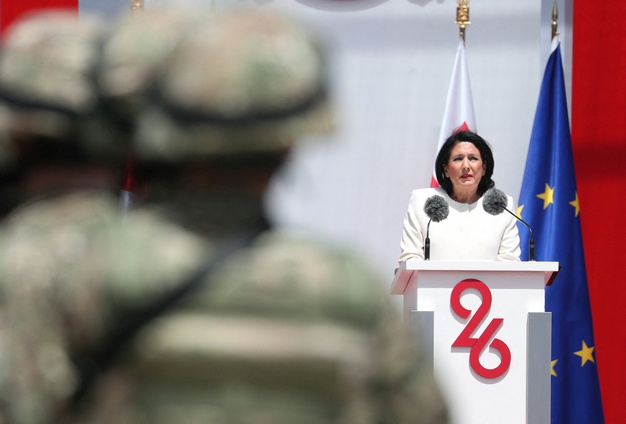Georgia's European choice
During three decades public opinion polls always confirmed that 75-85% of Georgia’s population firmly support the European and Euro-Atlantic integration of the country. Such a high three decade-long public support, can only be guaranteed when it is a truly historical and civilizational choice of the entire society of the Georgia.
DAVID DONDUA is the Ambassador of Georgia to the Hellenic Republic and the republic of Serbia.
It was not coincidental that in 2017 Georgian government delegation led by the Prime Minister in company with students and representatives of various communities flew to Athens on the very first flight after the launch of visa-free travel with the EU. It was a symbolic gesture to mark Georgia’s return to Europe through Greece.
Today when Georgia, alongside with Ukraine and Moldova (Associated Trio) has formally submitted its application to join the EU, Tbilisi again counts on Athens understanding and support for its aspiration. Submission of application was logical continuation of the process that Georgia started right after regaining independence in 1991 to find its proper place in the family of European democracies.
What always differed Georgia from its neighbors and countries in the wider region was very strong European identity of the society. When it has become inevitable that Soviet Union will cease its functioning, no one in Georgia debated which direction to go. It was obvious for almost every citizen that our future is within the family of European democracies. During three decades public opinion polls always confirmed that 75-85% of country’s population firmly support Georgia’s European and Euro-Atlantic integration. Such a high three decade-long public support, can only be guaranteed when it is a truly historical and civilizational choice of the entire society of the country.
Georgian military jets release smoke in the colors of the national flag during the Independence Day celebrations in Tbilisi, Georgia May 26, 2022. REUTERS/Irakli Gedenidze
-----------------------------------------------------
Those who doubt it, could look further back in history to find out that already in XVII century Georgian kings were dispatching envoys to the west to persuade European monarchs to embrace small Christian country in faraway Caucasus region that was squeezed between big and aggressive neighbors. It vividly shows that Georgia always preferred value based alignments, rather than opportunistic ones, when nations try to find protection under the powerful neighbor. Despite warm welcome and initial promises from Paris and Vatican, concrete historical circumstances made efforts of our ancestors all in vain.
Next brief opportunity emerged after the WWI, when Georgia declared independence after the collapse of the Russian empire. The primary objective of the government of the Democratic Republic of Georgia in 1918-1921 was focused on seeking diplomatic recognition by the international community and invitation of country to the League of Nations. Among other countries, Georgia had its ambassador in the Kingdom of Greece as well, to get recognition of its independence from oldest friend. Decision was matured and only Russia-led Red Army occupation and forceful Sovietization prevented Georgia to become full and formal member of free world.
Already 100 years ago, our country proved to be committed to the fundamental values, which form the cornerstone of the modern European Union - democracy, the rule of law, equality, protection of human rights and fundamental freedoms. These very values laid the groundwork for the Constitution of the Democratic Republic of Georgia in 1921, which due to the progressive ideas it embraced, was remarkable even in Europe of that time. It were the values enshrined in the first Constitution, which remained indelibly imprinted on our historical memory, and after regaining independence in 1991, continue to guide us to our historic home – European family.
Georgia’s European choice of its future was one of main reasons that Russia three times in last three decades launched a military offensive and war against sovereign country, which has resulted in 20% of our territories occupied by Russian Federation and more than 300 000 people forcefully displaced. Georgia in many occasions has paid and still continue to pay painful prize in various currencies for its European aspiration.
Since 2013 when Georgia signed Association Agreement (AA) and Deep and Comprehensive Free Trade Area (DCFTA) with the EU, our drive towards Europe took new impetus. These accords set a solid foundation for Georgia's political association and economic integration with the union.
Visa liberalization with the EU/Schengen states in 2017 was yet another important step to bring country closer to the EU. By opening its borders, our European partners recognized the progress made by Georgia and demonstrated wish and readiness to enhance people-to-people contacts. Visa-free travel offered our citizens opportunities that have already been translated into concrete, tangible results in tourism, business, student/academic exchanges, scientific cooperation and many other arias.
As we are preparing for the EU membership, we continue to successfully implement the AA/DCFTA, approximately 45% of which have been already fulfilled. The progress in this regard is irreversible and by the time we conclude the AA implementation process, about 70% of core EU acquis will be incorporated into national legislation, giving Georgia quite solid stance in terms of European integration. It worth to mention here, that during the implementation process Georgia was named strong front-runner for a number of years. Georgia had been very committed and eager to implement acquis and other criteria to get as closer as practicable to the EU, until political climate will become favorable for the formal invitation.
Initially the Government of Georgia was aiming to submit formal application for the EU membership in 2024, but current turbulent developments prompted countries of Associated Trio to speed up this process.
Today we and the entire world have found ourselves in a dangerous and rapidly changing new reality that, on the one hand, has drawn a bold line between freedom, democracy and value-based order vis-a-vis an authoritarianism, but on the other hand, has set the highest price for standing on the right side, especially, for those countries, geographically close to Russia and not having firm security guarantees. The entire security architecture of Europe is currently under serious threat. EU’s strategic autonomy must start with a strategic responsibility for the development and stability in the Eastern neighborhood. This is an exactly right time for applying a new, bold geostrategic vision to the eastern neighborhood.
Unfortunately, only at the highest possible cost of human tragedies it has become clear that shift in geopolitical approach is inevitable, and that new decisions should be based on a clear and simple understanding of the strategic reason for this region: if the EU ensures its engagement in wider European processes and exports sustainable peace into the Region, only then it safeguards its own stability and unhindered, peaceful development.
Georgia, Moldova and Ukraine have been defending their European choice at the expense of existential risks for a long time already. It is critical that decisions taken on the next steps of European integration of these three countries are merit-based and with full realization of the geopolitical context. If any of them are left behind in this process, it will be once again interpreted as accepting the Russian logic of having legitimate right to spheres of influence and further intervene, annex, occupy and drag us into uncertainty and security vacuum. It will also incentivize and fuel pro-Russian propaganda, which will negatively influence public opinion on European aspirations. On the other hand, granting all three associated countries EU candidate status would further support their complex reforms phase, strengthen competitiveness of their economies and rise confidence of Georgian population pin EU. Granting candidacy status to Georgia will also be encouraging signal to our citizens on the other side of the occupation line that Georgia irreversibly walks toward Europe and in united country they will be able to share all the benefits that EU offers to its members. That will become most effective instrument for Georgian government’s peaceful conflict resolution policy.
Georgian President Salome Zourabichvili delivers a speech during the Independence Day celebrations in Tbilisi, Georgia May 26, 2022. REUTERS/Irakli Gedenidze
-----------------------------------------------------
Political momentum should also be seized from the EU’s perspective. EU’s one of the strongest transformative powers has always been its enlargement tool with a powerful potential of further fostering and expanding democratic values and standards. While it is acknowledged that the process of European integration has its ups and downs in the Trio countries, their progress is still quite impressive.
According to the results of the recent Eastern Partnership Index 2020-21 the Trio has already secured considerable normative and sectoral approximation to the EU, mainly by implementing respective Association Agreements and demonstrated a good record in upholding Copenhagen criteria. By granting Trio countries a candidacy status and applying a revised enlargement methodology, which is largely based on conditionality scheme, the EU will retain a sole leverage on leading the accession phases on a merit based approach, while demonstrating strong political support to the Trio countries.
Copyright © 2022 by the Council on Foreign Relations, Inc.
All rights reserved.
Μπορείτε να ακολουθείτε το «Foreign Affairs, The Hellenic Edition» στο TWITTER στην διεύθυνση www.twitter.com/foreigngr αλλά και στο FACEBOOK, στην διεύθυνση www.facebook.com/ForeignAffairs.gr και στο linkedin στην διεύθυνση https://www.linkedin.com/company/foreign-affairs-the-hellenic-edition


